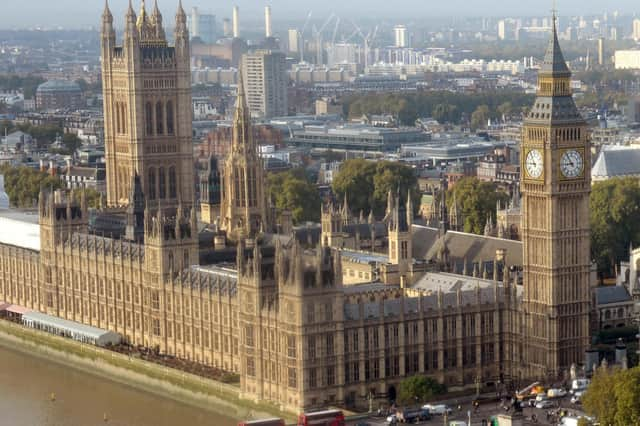Owen Polley: Pro-Windsor Framework propaganda will ramp up for the new parliamentary term


The pandemic made this type of retailing, which had already grown in importance, into a central part of most people’s lives. Online shopping is just one aspect of trade that is likely to get more complicated over the coming days, thanks to – you guessed it – the Windsor Framework.
The parcel giant DHL recently published a list of items that it now refuses to carry from companies in Great Britain to consumers in Northern Ireland. It was posted on Twitter last week by unionist activist and former election candidate, Alan Day.
Advertisement
Hide AdAdvertisement
Hide AdTo take just a few examples, the company will not accept drinks for delivery, most types of food, perfumes, hair products, leather goods, used clothes, photographic equipment or electrical items, if they’re being sent here.
That’s just part of an extensive list that ranges far beyond things like seeds, live animals or fur, that previously caused problems. DHL is interpreting new parcel regulations that were enacted under Rishi Sunak’s framework deal and its competitor, DPD, has produced a similar document.
Last week, the News Letter reported that Asda had started to label some of its food products in Northern Ireland with the words ‘Not for EU’. This is required to meet the criteria for accessing the so-called ‘green lane’, which Sunak told us would cut customs processes and bureaucracy for mainland companies doing business here. The supermarket behemoth is preparing for the new labelling regime, but many smaller traders still have unanswered questions about how it will operate.
Indeed, the foreign secretary, James Cleverly, originally claimed that ‘not for EU’ labels would be required UK-wide, to avoid making Northern Ireland even more of an exception within the British market. This failed to materialise, with the scheme’s proposed implementation in GB delayed until 2024, if it ever comes about. First there will be a consultation and probably a general election that the Conservatives are expected to lose.
Advertisement
Hide AdAdvertisement
Hide AdIt’s one of innumerable areas that a recent House of Lords’ report demanded that the government clarify, when its European committee investigated how the framework would operate come the autumn. The DUP MP, Sammy Wilson, pointed out last week that retailers are already starting to replace British products with alternatives from the Irish Republic, as a result of the new rules.
Despite all this, attempts to divert people’s attention from the Irish Sea border are intensifying, as politics gets back to normal after the summer. Last week, the NIO minister, Steve Baker, implied that unionists who reject the framework are ‘hardline’ and compared their anger with the sea border to opposition to the Belfast Agreement.
This kind of rhetoric will increase as the House of Commons gets back to work, the party conference season starts and an event approaches that aims to sell Northern Ireland to foreign investors. Of course, there is nothing wrong with trying to bring money and jobs to these shores: both are badly needed. Inevitably, that will involve something of a marketing pitch, and the government wants the message to be that Northern Ireland has ‘privileged access’ to both the UK and the EU markets.
You can expect to hear sceptics, who insist that the sea border created intractable problems rather than an enviable business environment, lambasted for spurning opportunities and talking Northern Ireland down. It’s important to remember, though, that Rishi Sunak’s assertion that we’re about to become “the most exciting economic zone on the planet,” is just a particularly inflated example of the spin, exaggeration and deception that accompanied the Windsor Framework from the beginning.
Advertisement
Hide AdAdvertisement
Hide AdEven the calmest commentators have started to realise that the government’s claims about that agreement have collapsed since its announcement in February and it will not solve the practical problems created by the protocol. Indeed, in the short-term, we know that it makes many things considerably worse, because it abolishes grace periods and other easements.
At best, then, the framework’s advocates are left with the less than tangible theory that it signals an improving relationship between the UK and the EU. They argue that this will allow the two sides to cooperate to Northern Ireland’s benefit in the future and resolve the worst elements of the sea border’s implementation. It’s a hopeful viewpoint, but it ignores the fact that Sunak reached a deal with Brussels by effectively capitulating to its demands, rather than brokering concessions.
Which brings us to the vexed issue of power-sharing and whether the DUP will go back into devolved government, some time before Christmas. We will be told, as the investment conference approaches, that investors are simply waiting for ‘political stability’ – for which read the restoration of a dysfunctional and ineffective executive at Stormont – before they swamp our economy with dollars and euros.
At the same time, if they’re back in office, our indefatigable team of ministers will apparently balance the budget, revamp our public services, tackle the cost of living crisis, reform the health service and complete all the other tasks that they didn’t get round to in the previous 25 years.
Advertisement
Hide AdAdvertisement
Hide AdWe should not forget that just a short time ago, successive prime ministers promised that any form of internal UK border was intolerable. Now, ministers imply that failing to accept being cut off from the rest of the nation’s economy is ‘hardline’ or unreasonable.
They really are full of it.